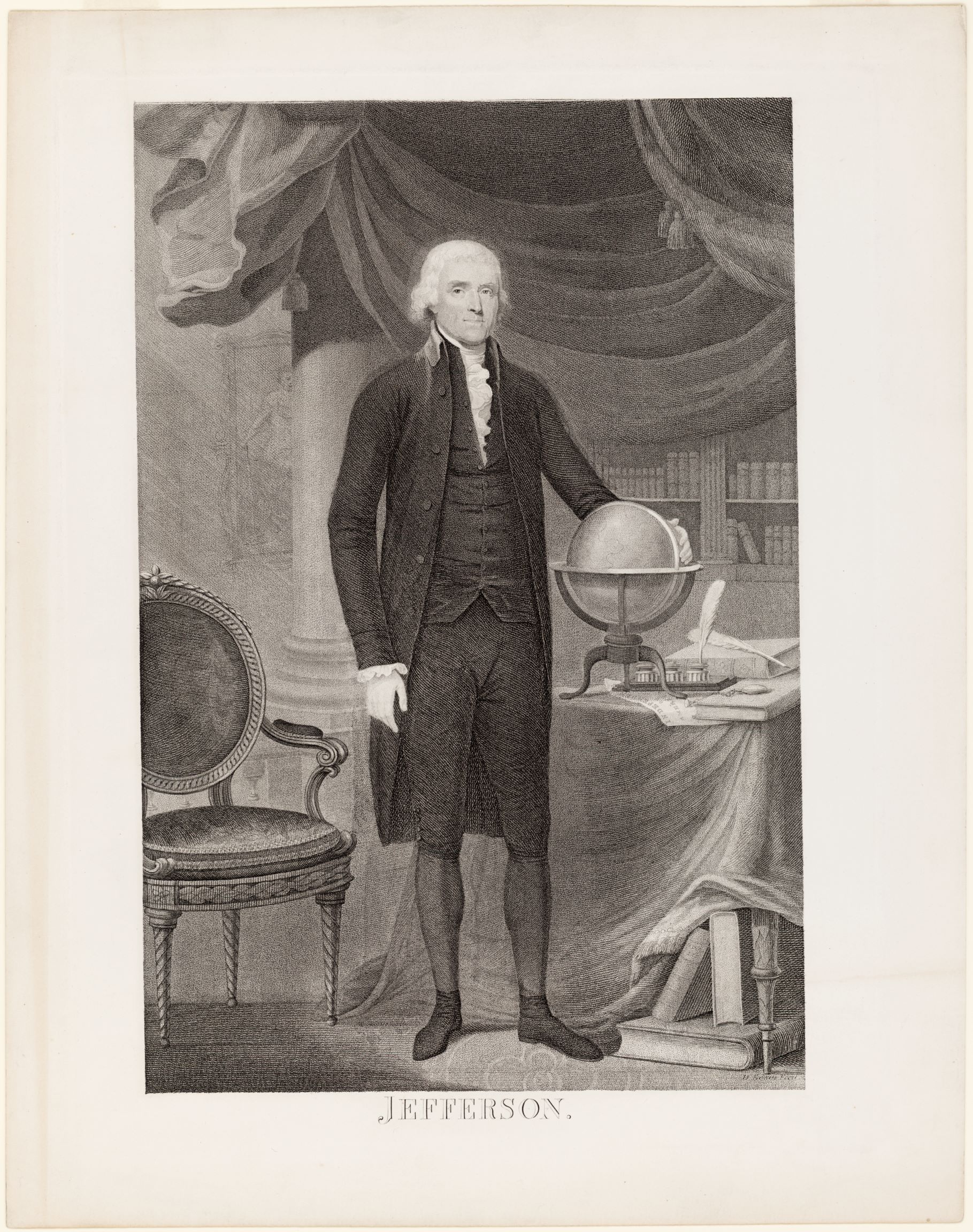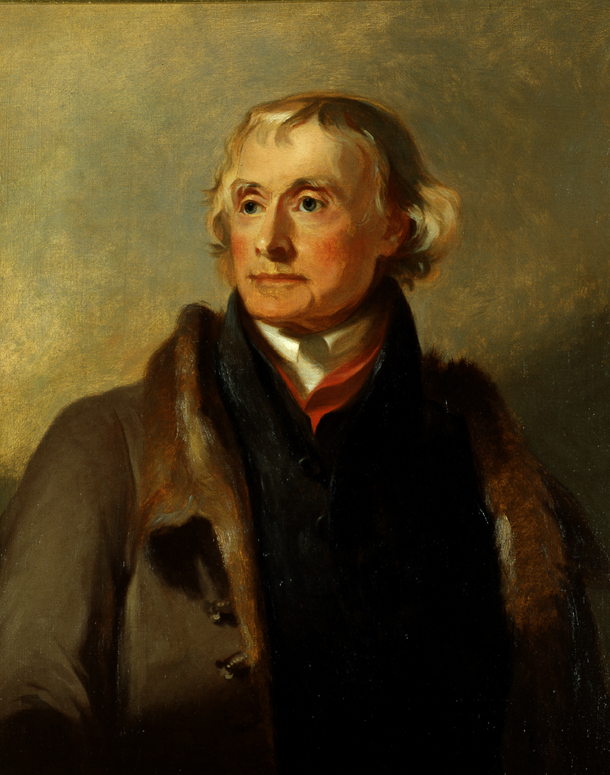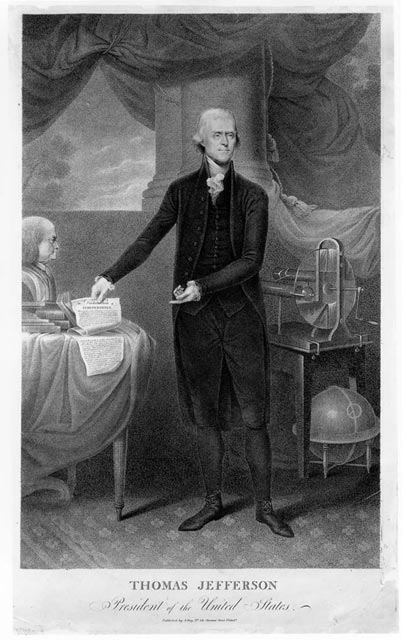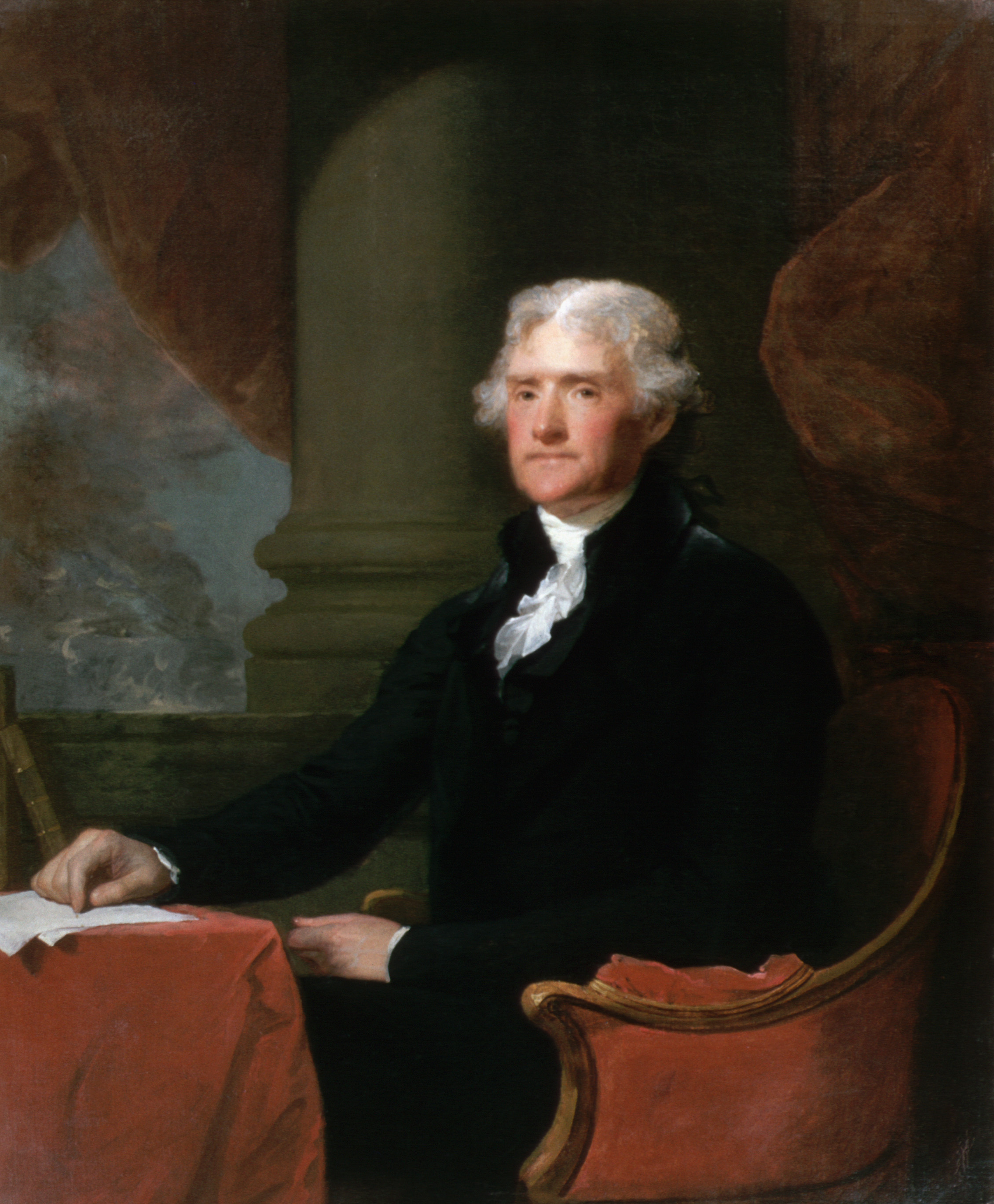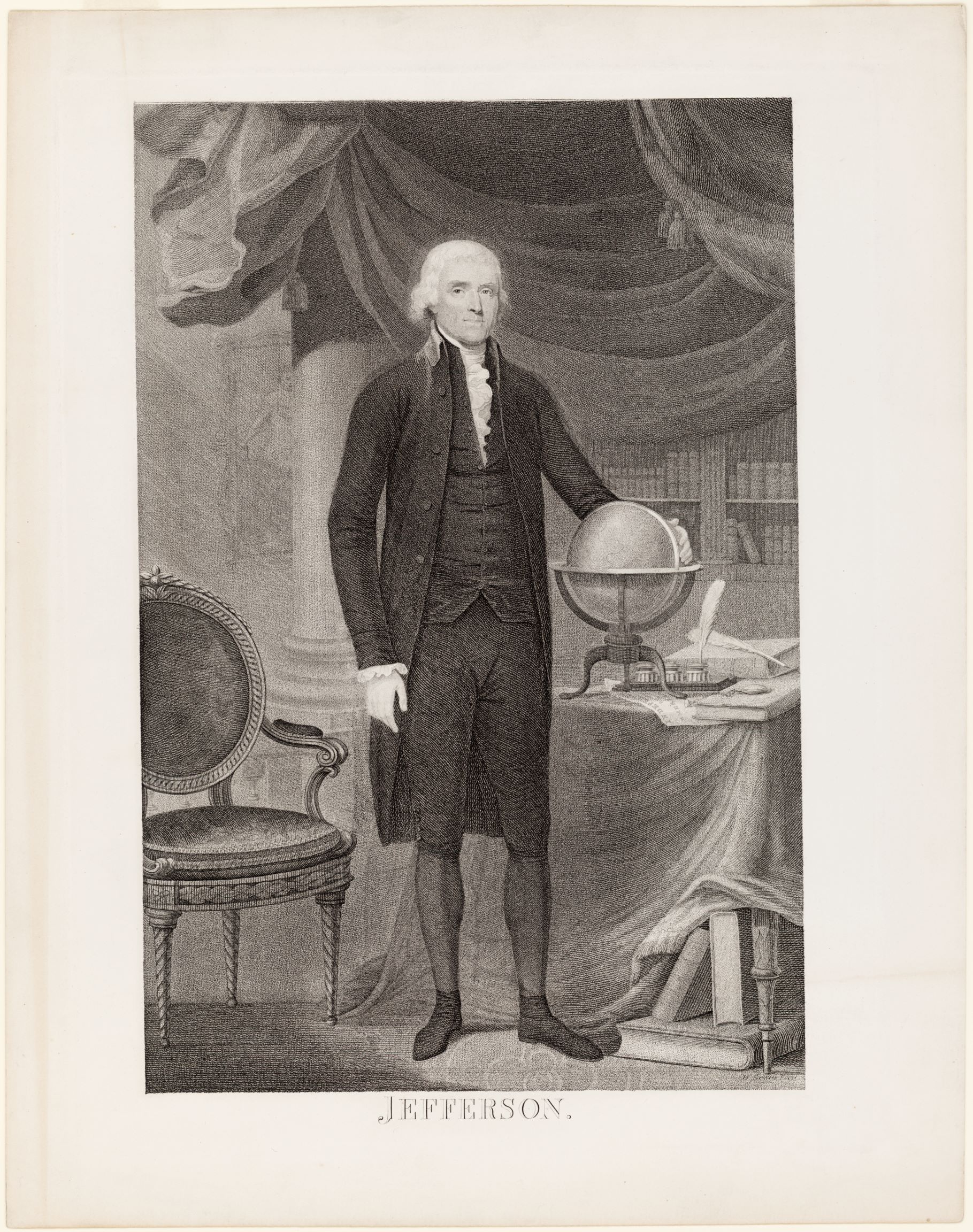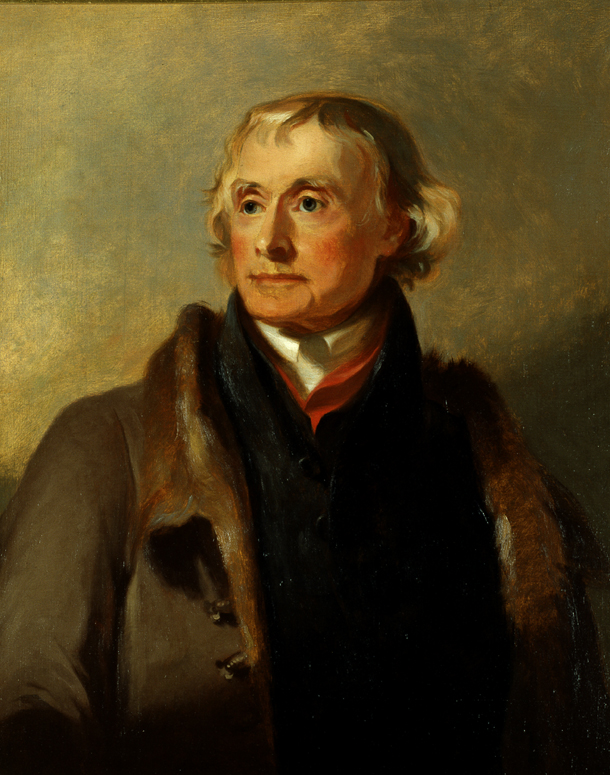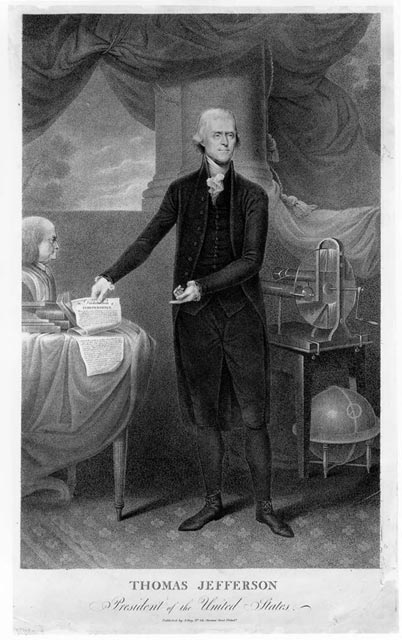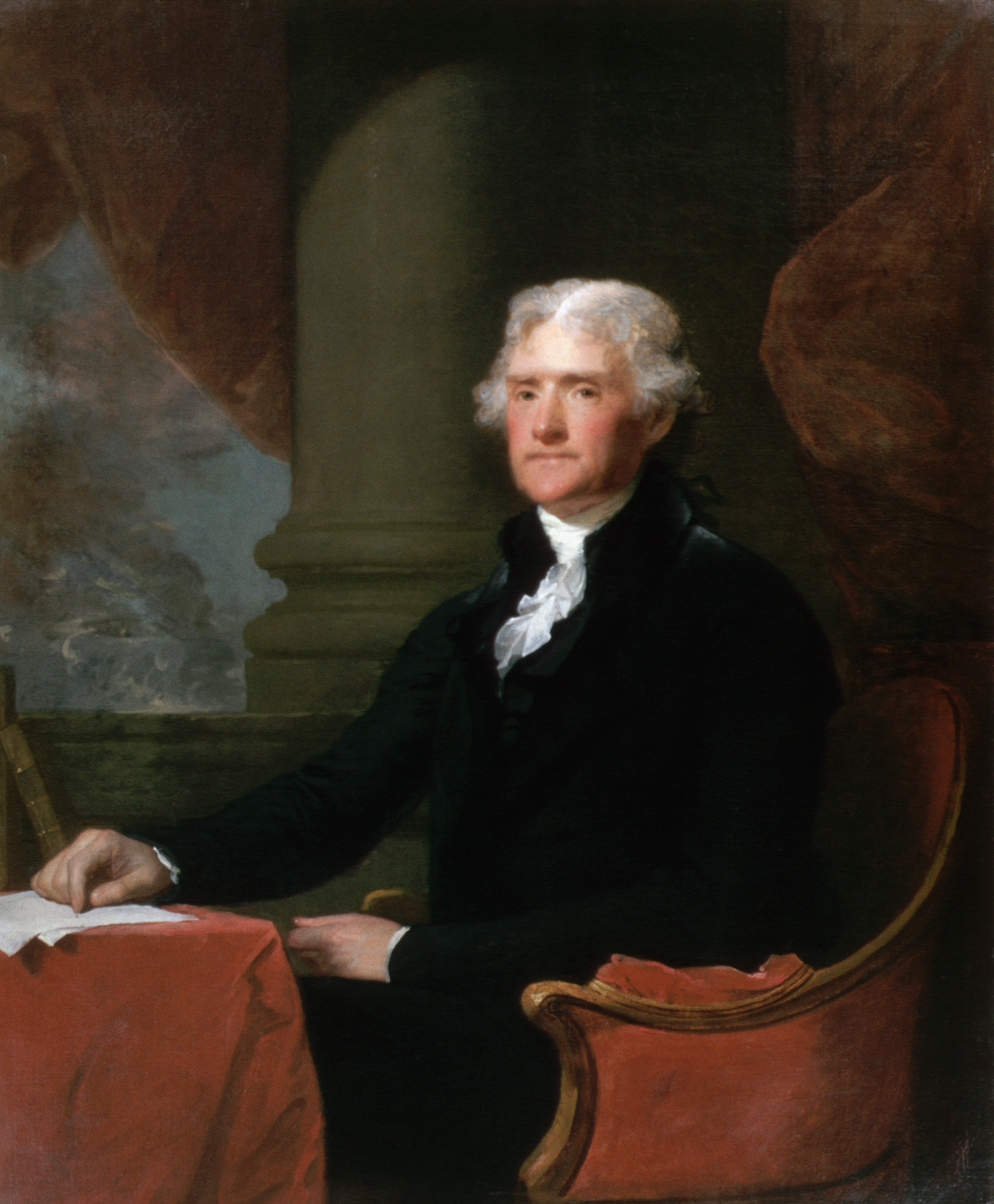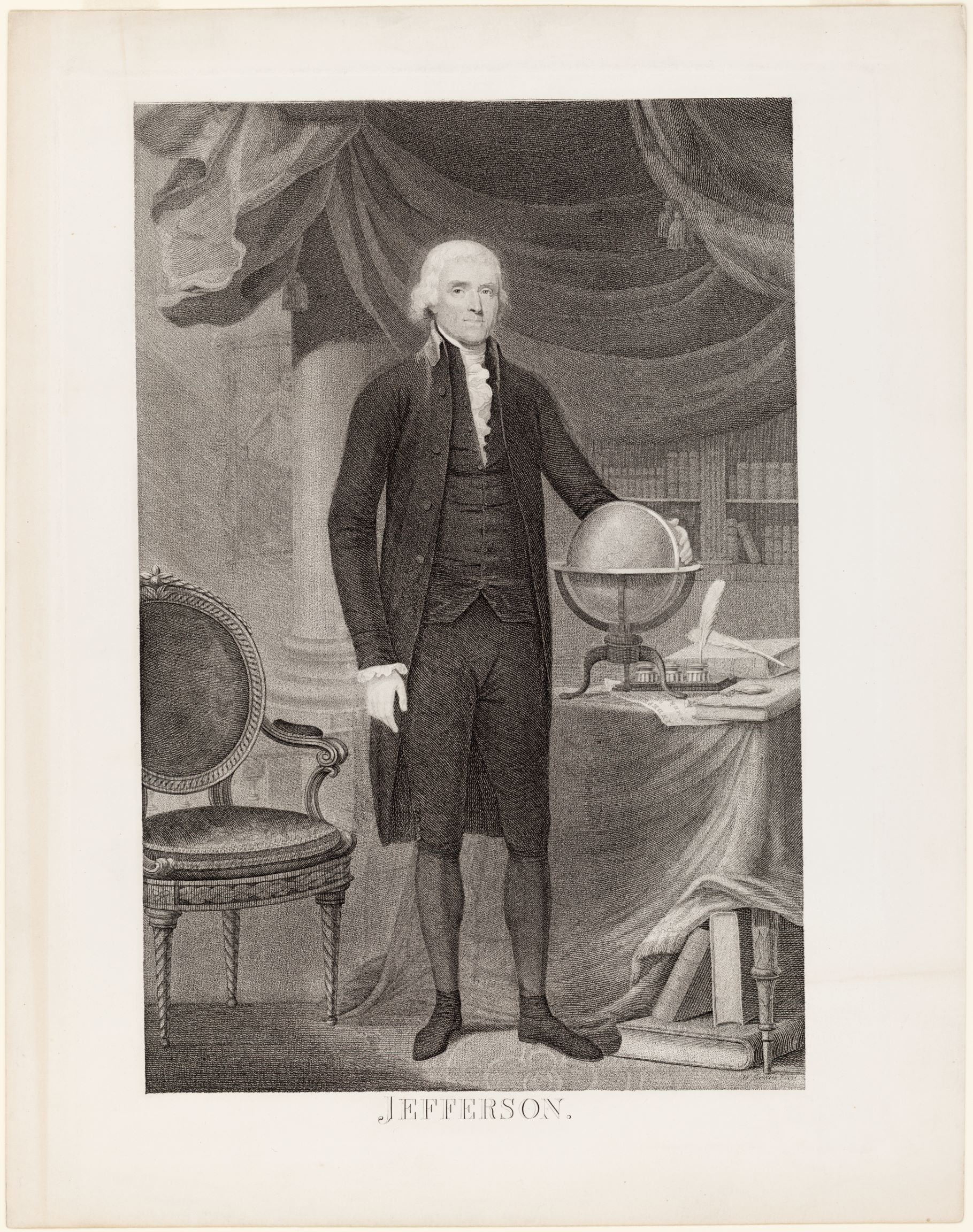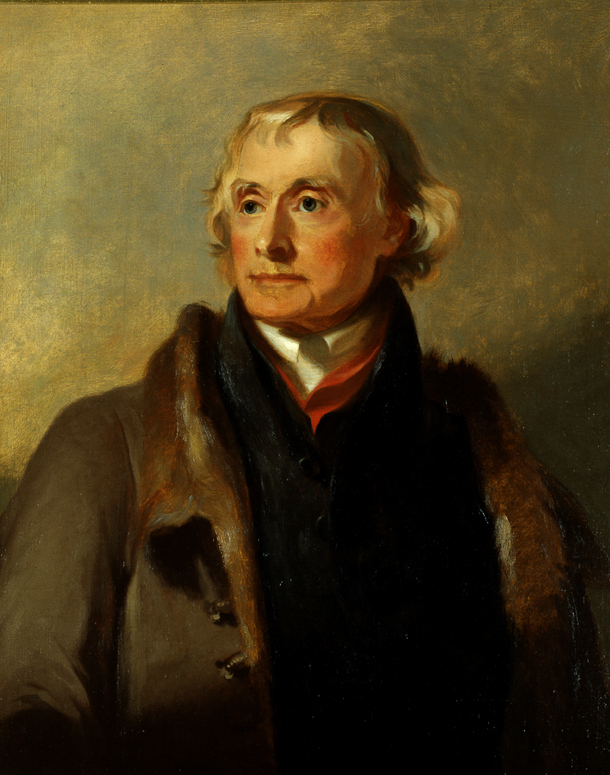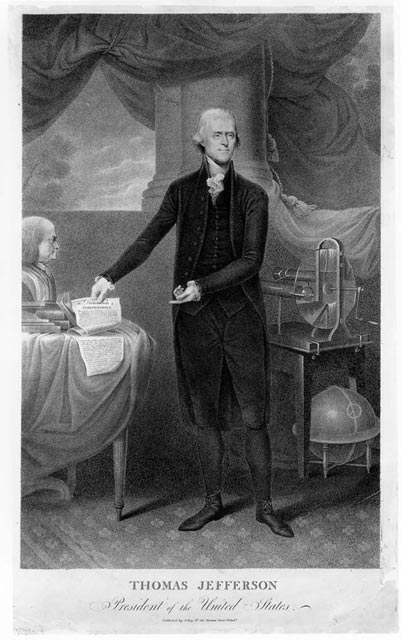“Oh God!” he exclaimed with his pulse weakening and his family surrounding his bedside.
Thomas Jefferson was dying and everyone, including the elderly statesman, knew it. His daughter and some of the family were present, Thomas Jefferson Randolph, known to the family as “Jeff,” grandson-in-law, Nicholas P. Trist, the youngest grandchildren including eight-year-old George Wythe Randolph, who “seeming not to comprehend the scene” asked his older brother “what all this means.” Possibly it was because his grandfather was drifting back in his remembrances to days long before he was born as he “spoke of the Committee of Safety” and how “it ought to be warned.” Discomfort came occasionally and was usually remedied with laudanum, a pain medication of opium.[2]
Awaking on the afternoon of the 3rd of July, 1826, Jefferson thought he heard Mr. Hatch’s name mentioned in the parlor next door and then asked to see him. Fredrick W. Hatch was his clergyman and a “kind and good neighbor” who lived two miles from Monticello. His grandson Jefferson decided this request was a mistake as his grandfather’s “religious opinions having been formed upon mature study and reflection,” were firm and set and therefore he indeed “did not desire the attendance of a clergyman.” What Jefferson would or would not have said to Mr. Hatch during those last hours remains a mystery.[3]
Jefferson during the night asked Dr. Dunglison “Is it the fourth?” The doctor replied, “It soon will be.” Confused, he then repeated the question to Trist, and he shook his head yes, falsely in the affirmative. Thus, believing it to be the fourth he was ready to die. In his impatience for the end at 9:00 p.m. then called out to God and refused any further medication remarking to Dr. Dunglison “No! Nothing more!”[4]
On July fourth his last moments were at hand. At 4:00 a.m. he “called the servants” in with a reported “strong and clear voice.” What he said to them, Thomas Jefferson’s true last words, regrettably were not recorded. At about 10:00 a.m. Jefferson was visibly uncomfortable and although his immediate family “painfully… could not understand” how to remedy the situation Burwell Colbert, ever present, did. Burwell, his enslaved house servant, elevated his head “restoring it to its usual position” and Jefferson “seemed satisfied.”[5]
Still at “his bed side” Trist wrote to his brother-in-law that “there is no longer any doubt” as “the machine was worn out in some of its essential parts, and therefore could not go on.” Jefferson had yearned to live to see “his own glorious fourth” and although many thought it might not happen, he had made it. At fifty minutes past noon “he ceased to breathe, without a struggle” and his grandson Jeff closed his eyes.[6]
He was buried late in the afternoon of July 6th, “without any pomp or procession, in compliance with his dying request” beneath a favorite oak at Monticello. Reverend Frederick Hatch presided over the ceremony, with thirty to forty family, friends, and admires in attendance. The first to be buried there was his “dearest friend he possessed on earth” and brother-in-law, Dabney Carr in 1773.[7]
To understand what honestly transpired at Monticello that summer day in 1826, we must delve deeper into events throughout Jefferson’s life. We do so to discover how Jefferson’s beliefs evolved, what truly is religious freedom, and how his descendants, who inherited Jefferson’s legacy, safeguarded his personal spiritual journey from that of the public persona.
Jefferson met Dabney Carr as boys studying with the “correct and classical scholar” Reverend James Maury. Maury, who was struggling financially, had opened a school to supplement his income. Maury focused his lessons with those that would be “of daily use to them as long as they live.” Practicality was key in educating Virginia gentlemen and this included literature, an “acquaintance with History” a “smattering…in Geography & Chronology” and “a general Knowledge of the Laws, Constitution, Interests & Religion of his Country.” For two years the boys lived with Maury and his family. During those two years the Maury’s financial situation, already “loaded with debt and taxes,” worsened. In 1758 the colonial government passed the “emergency act” to allow clergy to be paid in deflated currency rather than tobacco. “Slaves” Maury said, referencing British colonists, “have never yet been found as industrious as the sons of liberty.” His situation would in fact worsen in the coming years. Maury would win a court battle the “Parson’s Cause”, a suit for the reimbursement of his salary, but lose the war by being rewarded a penny. This legal battle played out in Williamsburg where Jefferson had newly enrolled in the College of William & Mary and laid the foundation of “de-establishing of churches as part of government in Virginia” and was hotly contested especially by his college’s professors.[8]
When Jefferson arrived at the College of William & Mary it had six professorships, one for mathematics, moral philosophy, Greek and Latin, two for divinity, and one the “Brafferton professorship” for “the instruction of the Indians, and their conversion to Christianity.” All professors came “recommended by the bishop of London and were generally ministers of the gospel…and licensed champions of orthodoxy” John Daly Burk noted in his History of Virginia. “Now and then, however…some unbeliever would steal into the fold… this was the case particularly in the mathematical department, for which the divines were generally incompetent.” Jefferson studied with only one professor: mathematics professor William Small. Small was a man of “an enlarged & liberal mind” and from his conversations Jefferson received his “first views of the expansion of science & of the system of things in which we are placed.” It was during his two years with Small that Jefferson began to question traditional religion. As Jefferson transitioned to the study of law in 1762 with George Wythe, Small left Virginia feeling exceedingly disenfranchised from the Anglican college order.[9]
Jefferson passed the bar under Wythe’s tutelage, and both would serve as delegates to the Second Continental Congress, it was there that Jefferson authored the Declaration of Independence. He left the Congress in late 1776 to join the “first republican legislature” in Virginia and to take up the fight to abolish “spiritual tyranny.” Passing the Virginia Statute of Religious Freedom was, he said, “the severest contest in which I have ever been engaged.” It was debated at “every session from 76 to 79.” As the bill reached passage an amendment was proposed that “
Jesus Christ” be added to the preamble, to specify Christ as the “holy author of our religion.” The “insertion was rejected by a great majority” Jefferson wrote in his autobiography, “in proof that they meant to comprehend, within the mantle of it’s protection, the Jew and the Gentile, the Christian and Mahometan, the Hindoo, and infidel of every denomination.”[10]
For Thomas Jefferson his personal faith came on alleged “full” display in the Election of 1800. In his first and only book
Notes on the State of Virginia, Jefferson openly affirmed his belief in the “right of conscience” as “answerable only to God.” “It does me no injury for my neighbour to say there are twenty gods, or no god. It neither picks my pocket nor breaks my leg.” This belief, at the turn of the nineteenth century where most U.S. citizens were evangelical protestants, was blasphemous as best. Early in the campaign, Alexander Hamilton wrote to John Jay that we must “prevent an Atheist in Religion and a Fanatic in politics from getting possession of the helm of the State.” Citizens were asked by
The Federal Gazette if there was an “enemy to the religion of Christ” in America, implying yes, it was Jefferson. Attacks in 1800 can be summarized as “GOD – AND A RELIGIOUS PRESIDENT or impiously declare for JEFFERSON – AND NO GOD.” During the campaign, Jefferson suffered in silence the categorical and repeatedly offensive charges by the Federalists that he was an atheist.[11]
Once the battle was won, he held firm to his belief in the separation between church and state as he balanced the “duties of his station.” Jefferson attended church services and even welcomed a 1,235 pound “Mammoth Cheese” engraved “Rebellion to tyrants is obedience to God” from Baptist minister, Elder John Leland and the people of Cheshire, Massachusetts in celebration of Jefferson’s support for religious liberty. On the same day as the arrival of the cheese, Jefferson penned this letter to the Danbury Baptists pronouncing “a wall of separation between church and state” and proclaiming, “religious rights shall never be infringed by any act of mine.” He remained firm in his political convictions and his personal beliefs. Jefferson’s faith was between him and his God, it was he said, “a subject on which I have ever been most scrupulously reserved.”[12]
“I was a hard student until I entered on the business of life” Jefferson wrote in 1819, and now in retirement was once again. A “zealous advocate” for learning, he guided friends and family alike in their educational pursuits. “Question with boldness even the existence of a god; because, if there be one, he must more approve of the homage of reason, than that of blindfolded fear” he wrote his nephew Peter Carr. Understanding scripture captivated Jefferson and he hoped all would embark on such a journey, for “human understanding” he said was “revelation from its maker….” For Jefferson, this spiritual examination resulted in the creation of “The Morals of Christ.” It embodied “the very words only of Jesus” and in them Jefferson found “the most sublime and benevolent code of morals which has ever been offered to man.” He did it “by cutting verse by verse out of the printed book, and arranging the matter” and said it was “as easily distinguishable as diamonds in a dunghill,” and in doing so restored the Bible “to the primitive simplicity of it’s founder.” Jefferson spoke of its creation to
John Adams and William Short, had the volume bound, and kept it to read, and reread. It was his.
Religion was to Jefferson his property of conscience and although it evolved over time with reflection and research it remained his alone, it was, he said, a matter between “our Maker and ourselves.” He professed to friends a belief in heaven where we would have “an ecstatic meeting with the friends we have loved & lost and whom we shall still love and never lose again.” Lovingly in 1825 he wrote to a namesake, Thomas Jefferson Smith to “adore God. reverence and cherish your parents. love your neighbor as yourself, and your country more than yourself. be just. be true. murmur not at the ways of Providence. So shall the shall the life into which you have entered be the Portal to one of eternal and ineffable bliss.” Jefferson attached Psalm XV and his ten Canons and ended the note, “and if to the dead it is permitted to care for the things of this world, every action of your life will be under my regard. farewell.” Jefferson died the next year.[14]
His grandson Jeff Randolph was made executor of the estate. A week after his death, writing to Dabney S. Carr, Jefferson’s nephew and his father’s namesake, he disclosed that he furnished the account of his grandfather’s death to The Enquirer but in it had “two little anecdotes omitted” both were religious in content. First the public would not know that Jefferson had thought he heard his clergyman Mr. Hatch and asked to see him. The second was that after he had received a “kind message from the N.York committee he observed that ‘he cheerfully committed his soul to his god. His child to his country.’” He justified his actions stating he never “doubted the correctness” of this decision. Jeff had also inherited Jefferson’s library and papers. The library he deposited at the University of Virginia to save it from “injury.” When Jefferson’s “Morals of Christ” was accidentally sent for sale to Washington in 1829, Jeff Randolph had it immediately retrieved. His papers, he would retain and, in the years to come, he would be the first editor of Jefferson’s collected writings. The publication would be for the “benefit of” Jefferson’s “creditors and secondly his family.” Editing the three volumes, he reviewed his grandfather’s thousands of letters to select those worthy of inclusion with his sisters “constantly employed in copying” them. Nothing would be more important in cementing Thomas Jefferson’s “legacy” than to bring “the (manuscripts) in to the market.”[15]
His monument, Jeff said, was “the mountain itself in whose bosom he is entombed”. There he placed over his grave an obelisk with what Jefferson “himself wished:
Here was buriedThomas Jefferson
Author of the Declaration of American Independence
of the Statute of Virginia for religious freedom& Father of the University of Virginia
His grandfather noting, “…by these as testimonial that I have lived, I wish most to be remembered.”
Jeff Randolph did everything to protect his grandfather’s memory and legacy, respecting in life and then death that there was a second “wall of separation,” this one between the public and private man. To the end he was the gatekeeper. When admirers visited the gravesite and repeatedly desecrated and destroyed the memorial in attempts to obtain tokens of remembrance he built “a high wall, iron gratings, and locks” however, in the end nothing he could do would “protect” his grave or Thomas Jefferson’s legacy from the picklocks.[16]
Endnotes
[1] Thomas Jefferson to Roger C. Weightman, Monticello, June 24, 1826, Published in “Jefferson Quotes & Family Letters,” Thomas Jefferson Foundation, Inc., https://tjrs.monticello.org, 2025.
[2] There are three accounts of Thomas Jefferson’s death from those who were present, Nicholas P. Trist’s, Thomas Jefferson Randolph’s, and Dr. Dunglison. See “Jefferson’s Last Words, Thomas Jefferson Encyclopedia, Monticello,
https://www.monticello.org/site/research-and-collections/jeffersons-last-words, 2025. Nicholas P. Trist’s account written to Joseph Coolidge on July 4th at Jefferson’s bed side mentions Jefferson’s “tone of impatience” and call of “Oh God!” along with his comment to Dr. Dunglison of “No! nothing more!” See Nicholas P. Trist to Joseph Coolidge, July 4th 1826 (9:15 a.m.) (ViU: Family Letters). Published in “Jefferson Quotes & Family Letters,” Thomas Jefferson Foundation, Inc., https://tjrs.monticello.org, 2025. Thomas Jefferson Randolph’s Account of Thomas Jefferson’s Death, written sometime between 1856 and 1858, mentions George Wythe Randolph’s reaction along with Jefferson’s desire for no more medication from Dr. Dunglison. Published in Henry S. Randall’s
Life of Thomas Jefferson (Boston, 1858), 3:543-4 and available in the “Jefferson Quotes & Family Letters,” Thomas Jefferson Foundation, Inc.,https://tjrs.monticello.org, 2025. Dr. Dunglison’s account likewise is mentioned in the Thomas Jefferson Encyclopedia and can be found Samuel X. Radbill, ed.,
The Autobiographical Ana of Robley Dunglison, M.D. (Philadelphia: American Philosopical Society, 1963), 32-33 and available online at
https://babel.hathitrust.org/cgi/pt?id=mdp.39076006462142;view=1up;seq=38.
[3] Thomas Jefferson Randolph’s Account of Thomas Jefferson’s Death, written sometime between 1856 and 1858, Published in Henry S. Randall’s
Life of Thomas Jefferson (Boston, 1858), 3:543-4 and available in the “Jefferson Quotes & Family Letters,” Thomas Jefferson Foundation, Inc., https://tjrs.monticello.org, 2025. References to Dr. Hatch’s residence being two miles from Monticello can be found on Wikipedia.
https://en.wikipedia.org/wiki/Frederick_Winslow_Hatch
[4] See Nicholas P. Trist to Joseph Coolidge, July 4th 1826 (9:15 a.m.) (ViU: Family Letters). Published in “Jefferson Quotes & Family Letters,” Thomas Jefferson Foundation, Inc., https://tjrs.monticello.org, 2025. See also Samuel X. Radbill, ed.,
The Autobiographical Ana of Robley Dunglison, M.D. (Philadelphia: American Philosophical Society, 1963), 32-33 and available online at
https://babel.hathitrust.org/cgi/pt?id=mdp.39076006462142;view=1up;seq=38.
[5] Thomas Jefferson Randolph’s Account of Thomas Jefferson’s Death, written sometime between 1856 and 1858, Published in Henry S. Randall’s Life of Thomas Jefferson (Boston, 1858), 3:543-4 and available in the “Jefferson Quotes & Family Letters,” Thomas Jefferson Foundation, Inc., https://tjrs.monticello.org, 2025.
[6] See Nicholas P. Trist to Joseph Coolidge, July 4th 1826 (9:15 a.m.) (ViU: Family Letters). Published in “Jefferson Quotes & Family Letters,” Thomas Jefferson Foundation, Inc., https://tjrs.monticello.org, 2019. Thomas Jefferson Randolph mentions closing Jefferson’s eyes. See Thomas Jefferson Randolph’s Account of Henry S. Randall’s Life of Thomas Jefferson (Boston, 1858), 3:543-4 and available in the “Jefferson Quotes & Family Letters,” Thomas Jefferson Foundation, Inc., https://tjrs.monticello.org, 2025.
[7] “Extract of a letter from the University of Virginia, dated the 6th instant,” Richmond Enquirer, July 14, 1826, pg 2; Andrew K Smith, available in the “Jefferson Quotes & Family Letters,” Thomas Jefferson Foundation, Inc., https://tjrs.monticello.org., 2025.and “Jefferson,” Charlottesville Weekly Chronicle, October 1875 from
www.monticello.org “Jefferson’s Funeral” 2025. For Jefferson's quote regarding Carr see Jefferson to Thomas Stone, 16 March 1782.
[8] Thomas Jefferson, Autobiography
Jefferson Writings, Library of America Edition, pg. 4. Reverend James Maury; A Dissertation on Education in the Form of a Letter from James Maury to Robert Jackson, July 17, 1762; Ed. By Helen Duprey Bullock, Papers Albemarle Historical Society, II 1942. James Maury 9 August 1755, available in Memoirs of a Huguenot Family by Ann Maury, 1852. For a summary of the Parson’s Clause see “The “Parson’s Cause:” Thomas Jefferson’ Teacher, Patrick Henry, and Religious Freedom by John Grady,
https://allthingsliberty.com/2018/04/the-parsons-cause-thomas-jeffersons-teacher-patrick-henry-and-religious-freedom, 2025.
[9] For information on the College of William & Mary’s professorships see Thomas Jefferson’s Notes on the State of Virginia, Query XV, Jefferson’s Writings, The Library of America Edition, page 276. For Jefferson’s views on Small see Jefferson’s Autobiography, ibid., pg. 4.; John Daly Burk, The History of Virginia, 1804, pgs. 399-400.
[10] Ibid, Jefferson’s Autobiography pgs. 35, 40.
[11] Thomas Jefferson, Notes on the State of Virginia, Query XVII, Religion, published in “Jefferson Quotes & Family Letters,” Thomas Jefferson Foundation, Inc., https://tjrs.monticello.org, 2025. Alexander Hamilton to John Jay, New York, May 7, 1800; Federal Gazette & Baltimore Daily Advertiser, September 8, 1800, Volume: XIII, Issue 2118, pg. 3. John Ragosta “U.S. Presidential Election of 1800” https://encyclopediavirginia.org/entires/u-s-presidential-election-of-1800, 2025.
[12] Thomas Jefferson’s Letter to the Danbury Baptist – Timeline Event from https://www.thearda.com/, 2025. To Richard Rush, M, 1813.
[13] “Thomas Jefferson to Vine Utley, 21 March 1819” Founders Online, National Archives, https://founders.archives.gov/documents/Jefferson/03-14-02-0144. [Original source: The Papers of Thomas Jefferson Retirement Series, vol. 14, 1 February to 31 August 1819, ed J. Jefferson Looney. Princeton: Princeton University Press, 20217, pp. 156-158] TJ to Thomas Cooper, March 1814. For the retrieval of “The Morals of Christ” see Mary J. Randolph to Nicholas P. Trist, Edgehill Feb. 24, 1829, found in the “Jefferson Quotes & Family Letters,” Thomas Jefferson Foundation, Inc., https://tjrs.monticello.org, 2025.
[14] Thomas Jefferson to Thomas Jefferson Smith, 21 February 1825, Founders Online, National Archives, https://founders.archives.gov/documents/Jefferson/98-01-02-4987. [This is an Early Access document from The papers of Thomas Jefferson: Retirement Series. It is not an authoritative final version.]
[15] Thomas Jefferson Randolph to Dabney S. Carr, Tufton July 11, 1826, available in the “Jefferson Quotes & Family Letters,” Thomas Jefferson Foundation, Inc.,https://tjrs.monticello.org, 2025. Thomas Jefferson Randolph to the University of Virginia Board of Visitors [before 7 Oct 1726] ibid., Martha Jefferson Randolph to Ann C. Morris, Boston, May 16, 1827, ibid.
[16] Thomas Jefferson Randolph to Charles Wirtenbaker January 1, 1856, to December 31, 1860 available in the “Jefferson Quotes & Family Letters,” Thomas Jefferson Foundation, Inc., https://tjrs.monticello.org, 2025.
